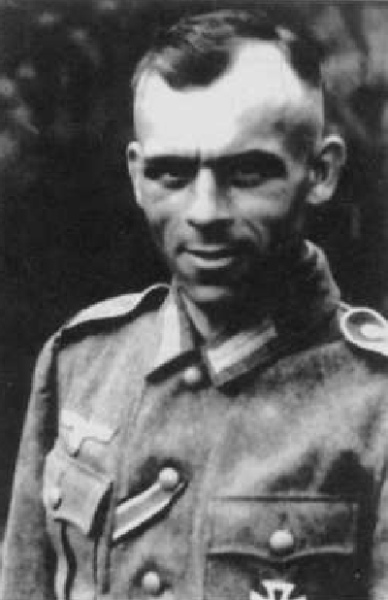Faust, Fritz
- Date of birth:
- October 23rd, 1910 (Gilge/Eastern Prussia, Germany)
- Date of death:
- March 14th, 1977 (Cologne/North Rhine-Westphalia, Germany)
- Nationality:
- German
Biography
Fritz Faust was Prisoner-of-War with the Soviets from 10th March 1945 until 23rd April 1948.
Do you have more information about this person? Inform us!
- Period:
- Second World War (1939-1945)
- Rank:
- Obergefreiter (Corporal)
- Unit:
- MG-Schütze, 3. Kompanie, Füsilier-Regiment 26, 30. Infanterie-Division, Heer
- Awarded on:
- August 20th, 1942
“Soldiers! The Führer and supreme commander of the Wehrmacht has awarded the Knight’s Cross of the Iron Cross to Obergefreiter Faust, of 3. Kompanie. It was bestowed upon him yesterday by the divisional commander in the presence of the participants of the winter battle between Lowati and Pola as well as representatives from the II. and Stab Bataillon.
Obergefreiter Faust received this high award for his outstanding bravery and success in battle during the time period 04.-07.02.1942. In these days he repeatedly distinguished himself as a tireless machine-gunner. He fought without rest for hours against the vastly superior hostile onslaught. Whenever a position had to be given up it was Faust who covered the rear of his Kompanie with his MG.
Between 00:00 and 02:00 on the 06.02.1942 an enemy thrust with about 80 men ensued against the eastern sector of Saosstrowje, in which Faust was positioned. Its entire garrison was working on the construction of this position. Rolling enemy bomber attacks and ceaseless enemy AT gun fire hindered the assigned sentries in their luckless watch over the sector. Nonetheless Faust managed to notice the enemy troops that had approached the positions under the cover of darkness and their own hail of bombs.
As no superior officers were to be found nearby in this urgent situation, he immediately decided to take over the leadership of the defensive battle himself. With great haste he assembled the remaining 3 men from his squad, and also subordinated about 15 nearby artillerymen to his command. Himself at their head, they defended against the enemy incursion in bitter close combat. His skillful leadership, outstanding determination and extraordinary bravery did not only thwart the enemy’s intentions. He also went above and beyond by destroying significant hostile elements and forcing the remainder to flee.
It is solely thanks to Faust’s actions that the Bataillon (at the time still not fully ready for defense and weakened by the preceding hardships it had undergone) was saved in a timely manner from an impending danger. A noteworthy defensive success was simultaneously achieved. Despite the unholy difficulties of the preceding days, the physical and mental exhaustion that they caused, hours-long defensive fighting under heavy enemy fire, ice-cold conditions, constant heavy losses and totally insufficient resupply, Faust did not rest during the whole night. Instead he worked tirelessly on the construction of his fighting position. More than this, he gave guidance to more inexperienced comrades from other combat branches with the construction of their positions and encouraged them to carry on their work until their entrenchments were in a defensible state.
Shortly afterwards, on the 07.02.1942, the Soviets once again assaulted Saosstrowje from the east and northeast with about 2 battalions and the support of numerous 7.62 cm guns. They were preceded by a fierce 30-45 minute drumfire. Once again it was Faust who tirelessly fired into the oncoming masses. To his right and left the battle positions had to be evacuated after they had been set afire. Although he was aware that he had been bypassed, he nonetheless continued to put up fierce resistance. After he himself received the order to evacuate his position he continued to hold out in his battle emplacement for some time. He had to fight his way back to his Kompanie through the village that the enemy had meanwhile entered into. On this day it was once again his outstanding bravery and headstrong determination that ensured the Bataillon (by now a small hardcore of officers and men) was able to disengage from the enemy and retreat in order.
In the relentless defensive combat of the 04.-07.02.1942 Faust proved to be a supreme example of bravery and devotion to duty. His independent action on the 06.02.1942 brought about a proud success that was of decisive importance for the prosecution of the battle. It also enabled the Bataillon (reduced to a tiny remnant as it was) to continue its sacrificial defensive battle to contain a Russian penetration south of Lake Ilmen, a battle that was vital for the entire northern front.
Obergefreiter Faust is the first enlisted man of the Division, indeed the first enlisted man of an Infanterie Schützenkompanie in general, to receive the Knight’s Cross. This well-deserved honour also applies to all comrades who gave their lives in the hard winter fighting. It applies to all men who, through their loyalty and bravery, contributed to the ultimate victory against all bitter attacks by the enemy. Along with 3. Kompanie, the entire Bataillon is proud to know that such a soldier walks within its’ ranks.”
- Period:
- Second World War (1939-1945)
- Awarded on:
- January 31st, 1942
- Period:
- Second World War (1939-1945)
Sources
- Photo 1: Wilco Vermeer collection
- - FELLGIEBEL, W.P., Elite of theThird Reich, Helion & Company Limited, Solihull, 2003.
- HUß, JüRGEN & SONDERMANN, HEINZ-WERNER, Ritterkreuzträger im Mannschaftsstand 1941-1945, VDM Heinz Nickel, Zweibrücken, 2009.
- THOMAS, FRANZ & WEGMANN, GüNTER, Die Ritterkreuzträger der Deutschen Wehrmacht 1939-1945, Biblio Verlag, Bissendorf, 2003.





